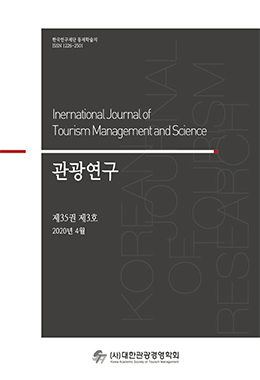본 연구의 목적은 잠재프로파일분석을 활용하여 여가제약협상에 따라 어떤 잠재계층이 존재하는지 확인하고, 그 특성 및 구조에 따라 유형화하는 것이다. 설문조사는 2018년 5월부터 2018년 7월까지 약 3개월에 걸쳐 이루어졌으며, 수원시의 결혼이민 관련 기관을 방문하여 해당 기관의 통역사/상담사와 함께 조사대상자와 1:1인터뷰를 실시하였다. 설문지는 중국어, 베트남어, 영어, 한국어 등 4개 국어로 구성하였으며, 유효 표본 197개를 획득하여 분석에 사용하였다. 분석결과, 응답자의 국적은 중국(44.2%), 베트남(38.1%)의 순으로 나타났으며, 학력은 고등학교 졸업이 43.7%로 가장 많았다. 응답자의 한국 거주기간은 평균 5.44년으로 나타났다. 잠재파일 분석결과, 여가제약협상에 대한 3개의 잠재프로파일이 도출되었으며, 동반자 탐색, 비용 절감, 기술습득, 시간 관리 등 여가제약협상전략에 따라 그룹명은 ‘소극형’, ‘배움형’, ‘적극형’으로 명명하였다. 교차분석과 일원분산분석을 사용하여 세 개의 하위유형을 결정하는 변인을 확인한 결과, 한국어 능력, 부부관계 만족도에서 차이가 있는 것으로 나타났다. 반면, 교육, 소득, 한국 거주기간, 가정 내에서 주로 사용하는 언어와 배우자의 모국어에 대한 언어능력은 차이가 없었다. 본 연구를 통해 결혼이주여성의 여가가 여가제약 상태에 머무는 것이 아니라 여가제약을 극복하기 위해 노력하는 여가제약협상 단계로 발전해 나가고 있음을 추론할 수 있었다. 또한 결혼이주여성이 한국어라는 언어제약을 극복했을 때, 그리고 화목한 가정환경 내에서 여가제약협상에 적극적일 수 있음을 확인하였다. 이러한 결과를 토대로 언어제약 극복을 위한 결혼이주여성에 대한 한국어 교육 지원 강화와 가족중심형 여가활동 활성화 지원 필요성을 언급하였다.
The purpose of this study is to identify what potential groups exist depending on leisure constraints negotiation by using latent profile analysis, and to categorize them according to their characteristics and structure. The survey was conducted over a period of 3 months from May through July 2018 through one-on-one interviews with interpreters or counselors at a marriage and immigration agency in Suwon City. Survey questions were asked in four languages: Chinese, Vietnamese, English, and Korean. 197 valid samples were obtained and included in analyses. The nationality of the majority of respondents were Chinese (44.2%) and Vietnamese (38.1%), and high school graduation (43.7%) was the most common level of education. Residency in Korea was on average 5.44 years. The results indicated three latent profiles with regard to the negotiation of leisure constraints - inactive, learning, and active - based on companion search, cost reduction, skill acquisition, and time management. Using cross-tabs and one-way ANOVAs, this study identified variables that comprise these 3sub types and found that there are significant differences across subtypes by Korean language proficiency and marital relationship satisfaction. On the other hand, there were no differences in education, income, length of residency in Korea, primary language used in the home, and spouse’s native language proficiency. These results indicate that married immigrant women’s leisure does not remain in a constrained state, but rather it is developing into a phase of leisure constraints negotiation in an effort to overcome leisure constraints. When the Korean language limitation is overcome, these women can be active in negotiations of leisure constraints within a harmonious family environment. These results suggest that Korean language education and family-centered leisure activities may be useful for supporting migrant women to overcome constraints on their leisure behaviors.


